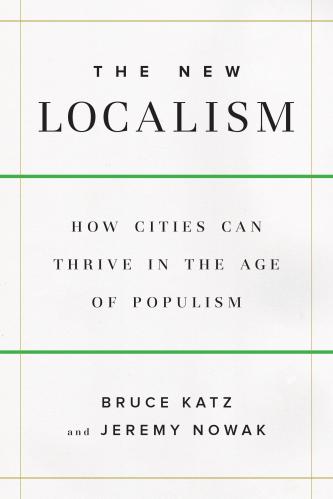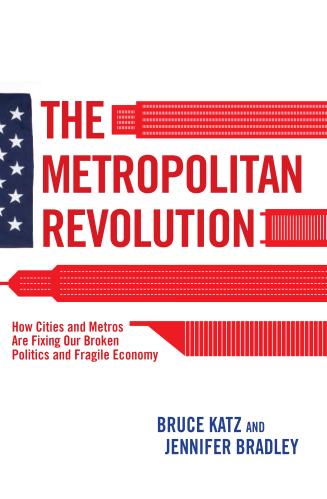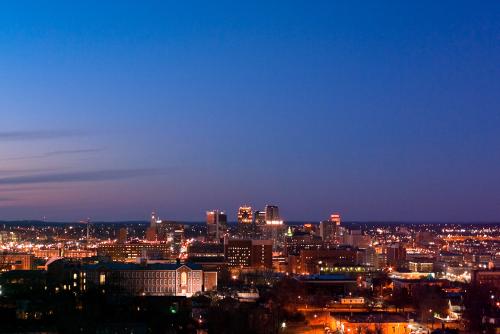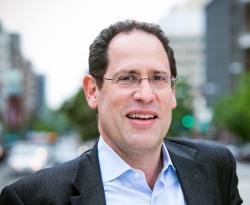This blog originally appeared on CityLab on May 28, 2017.
Emmanuel Macron’s decisive victory in France’s presidential election elicited an enormous sigh of relief in Europe and beyond. On the macro issues—the future of the European Union, the fate of open borders and open trade, a celebration of cultural diversity—Macron took clear and courageous stands. As Macron now turns to establishing a working coalition in Parliament in the June elections, he must also begin to deal with the metro issues that have emerged as flash points in France, England, the United States and elsewhere.
Three sets of issues—and three separate constituencies—will demand attention.
1) The economic anxiety and anger of forgotten people living in left-behind places.
Le Pen drew a good portion of her support from cities like Calais and small communes like Hayange, former industrial communities in France’s northern Rust Belt that have failed to find a new raison d’etre in the rapidly changing global economy. High poverty and unemployment has helped trigger deep resentment of France’s growing diversity. Macron’s victory in communities with over 10 percent unemployment shrunk to 15 percentage points, about half his national cushion. Similar dynamics were true with the election of Trump (think Erie, Pennsylvania) or Brexit (think Sunderland).
2) The growth of segregated immigrant enclaves in the suburbs of major cities such as Paris and Lyon.
These communities exist almost as parallel societies, isolated from educational and employment opportunities and characterized by insulated projects that house high concentrations of poor and disaffected populations. The anti-Islam fear stoked by Le Pen is abhorrent, and it doesn’t reflect the nation’s actual demographics or rate of immigration: Even after recent migration, France’s Muslim population is projected to only grow to 8.3 percent by 2020. But the economic and political disconnection of the banlieues is real: In the latest sign, voter absention in Seine-Saint-Denis, a district north of Paris that has the country’s highest immigrant population, was 32 percent, nearly 8 points above the national average.
3) The preferences of places with secure positions in the new global order.
Macron won nearly 90 percent of the vote in cosmopolitan Paris. Here, the issues facing national and city leaders will feel familiar to residents living in a prosperous metropolis like New York or London—the lack of affordable housing, the burdens imposed by traffic congestion and long commutes, and the existential crisis of climate change.
These metro challenges will require smart national policies and an even smarter partnership between the national government, cities and metropolitan areas. The good news: France has several examples of metro success to draw from, starting with the successful revival of Lyon, the third-largest city in France after Paris and Marseille.
I visited Lyon twice last year at the invitation of Mayor Gerard Collomb. He has been mayor of the city since 2001 and has been a prominent supporter of Macron since the inception of his political movement, En Marche, and the announcement of his presidential candidacy. Macron recently named him interior minister, reflecting their mutual appreciation.
The good news: France has several examples of metro success to draw from, starting with the successful revival of Lyon.
During his 16-year tenure, Mayor Collomb has engineered several remarkable structural reforms. He has been the catalyst behind the revitalization of Lyon Confluence, one of the largest urban renewal projects in Europe, located where the Rhône and Saône rivers meet. The secret to success: the establishment of a quasi-public, single-purpose development corporation similar to the entities responsible for the revival of the cores of Copenhagen and Hamburg.
Lyon Confluence is not just a real estate play; the hub of Lyon’s life sciences industry sits a stone’s throw from the district. One player in the hub: Lyon’s BIOASTER Technological Research Institute (TRI), which researches microbiology challenges through collaborations that include academics, start-ups, small and medium-sized enterprises, and industrial groups.
Finally, since January, 2015, Collomb has been the mayor not only of the city of Lyon but the President of the Metropole of Grand Lyon. This new metropolitan level government combines the city of Lyon with 58 suburban communes for purposes of conducting land use planning at the metropolitan scale, as well as carrying out business-attraction strategies. Lyon’s evolution as a Metropole should allow the thriving city center to have spillover benefits to surrounding “left behind” communities, rather than pitting adjacent jurisdictions against each other.
Mayor Collomb, in short, has engineered a distinctive model of governance that has the right scale, the right competencies, and the right mix of public sector vision and legitimacy and private sector discipline and entrepreneurism. The Lyon model doesn’t provide all the answers to France’s metro challenges. But there are discrete policies and practices that can be adapted by other cities and metropolitan communities to revitalize distressed areas, grow innovation ecosystems and districts, and promote smart and sustainable growth.
President Macron’s victory has been rightly celebrated by stakeholders dependent on macro policy. But a focus on the complex economic, social, and environmental issues facing France’s cities and metropolitan areas is equally important.
One personal note. I met Macron at a gathering in Lyon hosted by Mayor Collomb last September. We talked about the Lyon Confluence effort as a possible model that might inform not just France but Europe, the United States, and beyond. Macron came across as smart, pragmatic and intellectually curious—the qualities all nations might hope for in a leader. We may find that the next burst of local/national collaborations have a distinctly French flavor.




![Refugees at Budapest Keleti railway station [photo credit: Rebecca Harms, September 4, 2015]](https://www.brookings.edu/wp-content/uploads/2017/05/refugees_budapest001.jpg?quality=75&w=500)




Commentary
Macron’s three metropolitan challenges
June 14, 2017